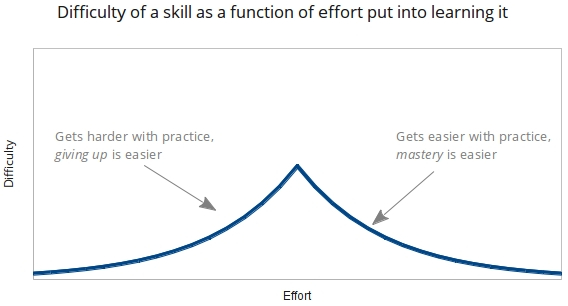Model to motivate putting in the effort to get good at something
[Today is the sixteenth in a series on daily and weekly beliefs that improve my life and may improve yours, in no particular order. See the introduction to the series and the value of flexibility in beliefs for background.]
Today’s model is a simple picture that illustrates the difficulty in getting good at a complex skill. It motivates me to put in the effort to get good at something and prepares me for the challenges.
A model for how hard it is to get good at something
This graph illustrates how hard I think getting good at something is. It shows that before you put significant effort into learning a new skill, it doesn’t create any difficulty in your life.
As you put in more effort, that skill creates more and more difficulty in your life.
Consider, for example, if you want to improve your public speaking. Before you try to improve, you don’t speak in public, so it doesn’t cause any difficulty. As you start to put in effort, it makes your life harder — you speak in front of more people, you try techniques that risk making you look silly, you realize nuances you didn’t know before that you’re doing wrong, and so on.
While you’re still ramping up, more effort makes your life more difficult. It doesn’t seem worth it. Except for that cusp. After that cusp, more effort makes you life easier.
Reaching that cusp doesn’t necessarily mean you’ve mastered the skill, but once you reach it, you tend to want to practice that activity more instead of less. So reaching mastery from there is like rolling downhill.
For example, think of people you know who find playing a musical instrument relaxing. For them to improve is easy since they like it. They are past the cusp. My music lessons growing up never got me to the cusp, so I never took to playing. I was always going uphill. On the other hand, learning math and physics got me over the cusp somewhere in college, so that I liked working on those problems.
Same with sports. When I first starting playing ultimate, my skills weren’t great. I enjoyed playing, but it was hard to improve. I wasn’t a complete player, so playing better only exposed other weaknesses. If I did improve, it didn’t stick. After I reached a certain level, improvements got me more playing time and I enjoyed improving more.
Same with romantic relationships. When you first meet someone, you are nervous to share things about yourself. It’s scary risking rejection. After you share a certain amount you pass that cusp and you find yourself wanting to share things you haven’t before. Then you want to put in more effort.
Same with getting in shape. If you don’t try, no problem. Once you start trying it gets harder—you newly have to pay attention to what you eat, you have to exercise when you didn’t before, people might suggest you can’t do it, you have to work before you see results. The cusp may come when you start seeing definition you didn’t before, or people start to compliment you, or you start enjoying what you eat more, etc. Then you enjoy working harder at it, or cooking with more fresh fruits and vegetables, or whatever made things easier and more enjoyable for you.
When I use this belief
I use this belief when I’m on the left side of the cusp learning a skill. It makes me feel calm about how things keep getting more difficult because I expect it and it motivates me to get over the cusp, because then I know the skill or activity will make my life easier and more fun.
What this belief replaces
This belief replaces feelings of frustration that come when trying to learn something hard with the expectation that it will get easier. Not just easier later, but increasingly easier.
Where this belief leads
This belief leads to putting in the effort to get good at challenging skills and enjoying the process more.
Read my weekly newsletter

On initiative, leadership, the environment, and burpees

Pingback: Magic Trick Skill Levels Vs. Effort Levels